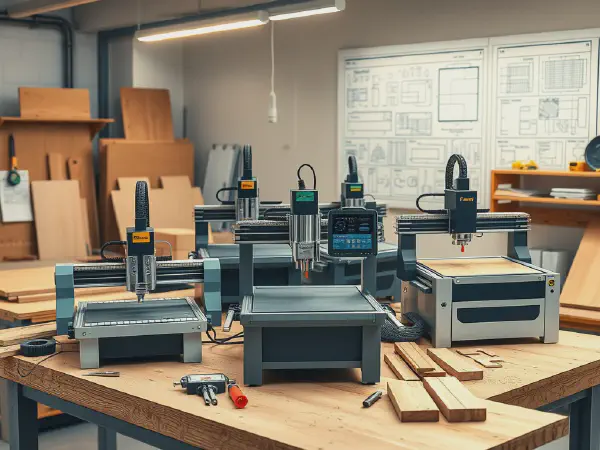Best CNC Routers for Home Business 2024: Ultimate Guide & Reviews

The Ultimate Guide to the Best CNC Routers for Home Businesses (2024)
Unlock the potential of your home business with our comprehensive guide to the best CNC routers. We delve into top-rated models, buying considerations, and success stories to help you make informed decisions and maximize your productivity.
What is a CNC Router? A Powerful Tool for Home Business
A CNC router, or Computer Numerical Control router, is a computer-controlled cutting machine that uses a rotating spindle to remove material from a workpiece. These machines are the workhorses of modern manufacturing and are especially valuable for home businesses that require precision, efficiency, and the ability to create custom products. They transform designs into physical objects with incredible accuracy.
Unlike manual routers, CNC routers automate the cutting process. This means you can achieve complex designs and create multiple identical parts with ease. They're widely used for cutting and carving a variety of materials, including wood, plastic, aluminum, and composites.
Benefits of Using a CNC Router for Your Home Business
- Increased Efficiency: Automate your cutting processes to save time and labor.
- Enhanced Precision: Achieve consistent and accurate results, improving product quality.
- Versatility: Work with a wide range of materials, including wood, plastic, and metal.
- Reduced Waste: Optimize material usage to minimize waste and reduce costs.
- Scalability: Easily produce multiple identical parts to meet growing demand.
- Design Flexibility: Create intricate designs and complex shapes that would be difficult or impossible manually.
Top CNC Router Models for Home Business (2024) – Detailed Reviews & Comparisons
Choosing the right CNC router is critical. Here's our curated list of the best CNC routers for home business, comparing their features, specifications, and ideal applications:
1. [Brand/Model Name] - Best Overall
Key Features: [List key features, e.g., Cutting area, spindle power, software compatibility, build quality]. This model offers a great balance of features, affordability, and ease of use, making it perfect for various home business applications.
Pros: [List pros, e.g., User-friendly software, sturdy construction, excellent customer support].
Cons: [List cons, e.g., Limited cutting depth, slightly higher price point].
Ideal for: [Target audience, e.g., Woodworkers, sign makers, hobbyists].
2. [Brand/Model Name] - Best Budget CNC Router
Key Features: [List key features]. This CNC router provides an accessible entry point for home businesses on a budget.
Pros: [List pros].
Cons: [List cons].
Ideal for: [Target audience].
3. [Brand/Model Name] - Best for Woodworking
Key Features: [List key features]. Specifically designed to handle woodworking projects.
Pros: [List pros].
Cons: [List cons].
Ideal for: [Target audience].
4. [Brand/Model Name] - Best for Metal
Key Features: [List key features]. Specifically designed to handle metal projects.
Pros: [List pros].
Cons: [List cons].
Ideal for: [Target audience].
5. [Brand/Model Name] - Best for Large Projects
Key Features: [List key features]. For large format projects that demand a bigger work area.
Pros: [List pros].
Cons: [List cons].
Ideal for: [Target audience].
[Repeat sections for up to 5 reviewed models, providing detailed specifications and comparisons.]
Buying Guide: What to Consider When Choosing a CNC Router
Before investing in a CNC router, consider these key factors:
- Cutting Area: Ensure the router's work area accommodates your typical project sizes.
- Spindle Power: Higher power is needed for harder materials and faster cutting.
- Accuracy & Precision: Look for routers that offer precise and accurate cuts.
- Software Compatibility: Verify compatibility with your preferred design software (e.g., Fusion 360, Vectric).
- Material Compatibility: Check the router's ability to handle the materials you plan to use (wood, plastic, aluminum, etc.).
- Build Quality & Durability: A robust machine will provide better long-term performance.
- Price & Budget: Set a realistic budget and consider the long-term ROI.
- Customer Support & Warranty: Assess the manufacturer's support and warranty options.
Setting Up and Using Your CNC Router: Step-by-Step Guide
Follow these steps to get started:
- Workspace Preparation: Dedicate a suitable area with adequate space and ventilation.
- Installation & Calibration: Follow the manufacturer's instructions for proper setup.
- Material Selection: Choose materials appropriate for your router and project.
- Software Training: Learn your design and control software.
- Safety Precautions: Always wear safety glasses, hearing protection, and appropriate attire.
- Maintenance: Regularly clean and lubricate your machine for optimal performance.
Success Stories: Home Businesses Thriving with CNC Routers
Real-world examples of home businesses using CNC routers to achieve success:
[Business Name 1]
Industry: [e.g., Custom Signage].
Challenge: [e.g., Producing high-quality signs efficiently].
Solution: [e.g., Investing in a [Router Model] to automate production].
Results: [e.g., Increased production, improved quality, and expanded product offerings].
[Business Name 2]
Industry: [e.g., Custom Furniture].
Challenge: [e.g., Creating complex furniture designs with precision].
Solution: [e.g., Using a [Router Model] to cut intricate joinery and designs].
Results: [e.g., Gained a competitive edge with unique designs and faster turnaround times].
[Include 3-5 more success stories, highlighting the impact of CNC routers on different home businesses.]
Conclusion: Empower Your Home Business with a CNC Router
A CNC router can be a game-changer for your home business, offering increased efficiency, precision, and design flexibility. By carefully considering your needs and exploring the top models available, you can choose the perfect machine to enhance your productivity and grow your business. Start your journey towards automated excellence today!
Ready to get started? Research the models we've recommended, compare prices, and start planning your next project!
